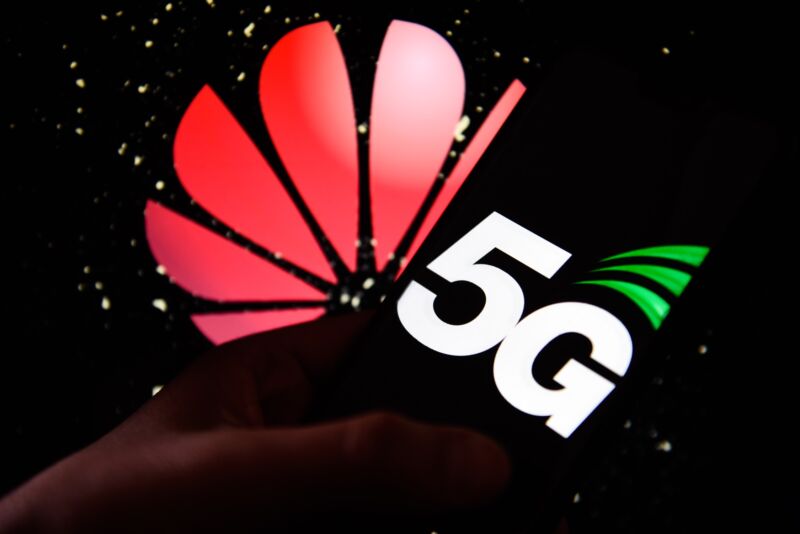
The UK government today announced a ban on Huawei equipment in 5G wireless networks, along with a plan to urge home-Internet providers to stop buying Huawei gear. The UK government's announcement said that US sanctions imposed in May factored heavily into the decision, which was "taken today in a meeting of the National Security Council (NSC) chaired by the Prime Minister [Boris Johnson]."
"Following US sanctions against Huawei and updated technical advice from our cyber experts, the government has decided it is necessary to ban Huawei from our 5G networks," UK Digital Secretary Oliver Dowden said in the announcement. A New York Times report called today's UK announcement "a victory for the Trump administration and a reversal of an earlier decision that underscores how technology has taken center stage in the deepening divide between Western powers and China."
Under the new rules, the UK said that "buying new Huawei 5G equipment [is] banned after 31 December 2020" and that "Huawei will be completely removed from the UK's 5G networks by the end of 2027." Today's announcement expands on an earlier ban that applies to the "most sensitive 'core' parts of 5G network[s]," the UK said.
While there isn't a corresponding ban on Huawei gear in home-broadband networks, the UK said it is "advising full fiber operators to transition away from purchasing new Huawei equipment" and recommended a transition of two years or less. The UK government said it is taking this more lenient approach for wireline networks because "the UK has managed Huawei's presence in the UK's fixed access networks since 2005 and we also need to avoid a situation where broadband operators are reliant on a single supplier for their equipment."
"This approach strikes the right balance by recognizing full fiber's established presence and supporting the connections that the public relies on, while fully addressing the security concerns of our world leading experts," the UK said.
4G and older wireless networks will apparently be allowed to keep using Huawei gear. Dowden said in a statement to the House of Commons today that "we will need to take a different approach to full fiber and older networks—one that recognizes that they are different to 5G in terms of their technology, their security, and the vendors supporting them." As the NYT wrote, "the latest British security assessment has concluded that there was no need to eliminate Huawei's role in earlier 2G, 3G and 4G networks, and the government is not seeking to discourage consumers from using Huawei products."
A Huawei spokesperson told Ars that the ban "threatens to move Britain into the digital slow lane, push up bills, and deepen the digital divide." The decision "is about US trade policy and not security," Huawei said.
US sanctions’ impact
The UK explained that US sanctions against Huawei "remov[ed] the firm's access to products that have been built based on US semiconductor technology." The UK said its technical experts at the National Cyber Security Centre (NCSC) "reviewed the consequences of the sanctions and concluded [that Huawei] will need to do a major reconfiguration of its supply chain as it will no longer have access to the technology on which it currently relies and there are no alternatives which we have sufficient confidence in. They found the new restrictions make it impossible to continue to guarantee the security of Huawei equipment in the future."
Dowden said that even before the US sanctions, UK officials "have been clear-eyed from the start that the Chinese-owned vendors Huawei and ZTE were deemed to be high risk." High-risk vendors that "pose greater security and resilience risks to the UK's networks" should be kept "outside the network's core and away from critical infrastructure and sites," Dowden said.
Huawei denied that US sanctions will prevent it from offering secure technology. "We remain confident that the new US restrictions would not have affected the resilience or security of the products we supply to the UK," Huawei's statement to Ars said. Huawei urged the UK to reconsider the ban and said the company "will conduct a detailed review of what today’s announcement means for our business here and will work with the UK government to explain how we can continue to contribute to a better connected Britain."
In the United States, the Federal Communications Commission banned Huawei and ZTE equipment in projects paid for by the FCC's Universal Service Fund (USF). The FCC ban took effect on July 1, and it prevents ISPs from using USF money to purchase or maintain Huawei and ZTE gear. Future US actions may require ripping out old Huawei and ZTE gear from these networks.
FCC Chairman Ajit Pai has argued that Huawei and ZTE "have close ties to China's Communist government and military apparatus" and "are subject to Chinese laws broadly obligating them to cooperate with any request from the country's intelligence services and to keep those requests secret." Huawei has said it doesn't have secret access to phone networks and that the US has not provided evidence for its claims.
Huawei sued the FCC to stop the USF ban, and briefs by Huawei and the FCC were submitted in court earlier this month.
Business - Latest - Google News
July 15, 2020 at 12:21AM
https://ift.tt/2CdvaRz
UK bans Huawei from 5G networks in “victory for the Trump administration” - Ars Technica
Business - Latest - Google News
https://ift.tt/2Rx7A4Y
Bagikan Berita Ini














0 Response to "UK bans Huawei from 5G networks in “victory for the Trump administration” - Ars Technica"
Post a Comment